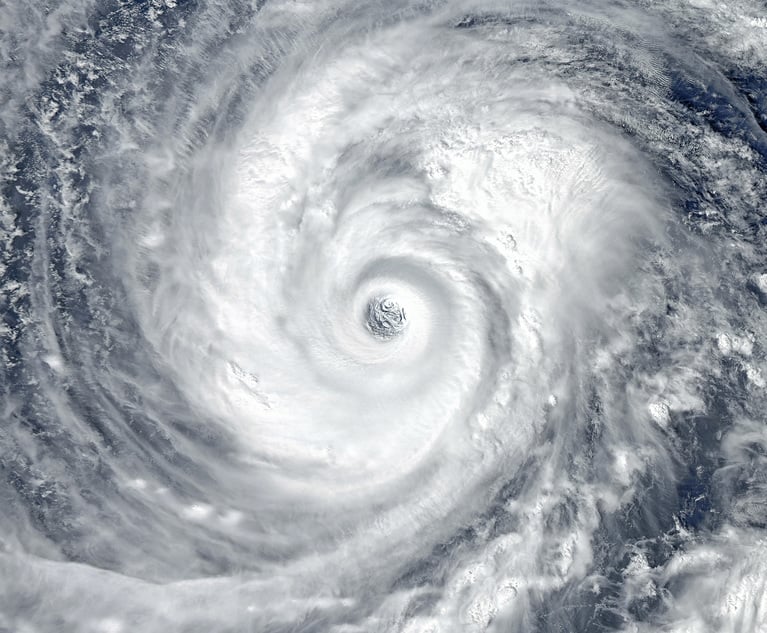Insurers Foresee A Crisis Without Backstop
|By Steven Brostoff, Washington Editor
|NU Online News Service, Jan. 18, 3:53 p.m. EST,Washington?While "the sky did not fall" on Jan. 1, acrisis nevertheless looms in the commercial insurance market unlessCongress enacts a federal backstop for terrorism losses, industryrepresentatives told state regulators yesterday.
|During a hearing before the Reinsurance Task Force of theNational Association of Insurance Commissioners, representatives ofprimary insurers and reinsurers painted a grim picture of theinsurance market since the terrorist attacks of Sept. 11.
|Warren Heck, chairman of the New York City-based Greater NewYork Mutual Insurance Company, said that since Jan. 1 terroristacts have been excluded in reinsurance agreements.
|Moreover, he said, these exclusions are accompanied bysignificant rate increases.
|This has forced primary insurers to respond by eithernon-renewing policies, excluding terrorism coverage where possibleor limiting primary coverage amounts, Mr. Heck said.
|"All these factors can only lead to one conclusion: Failure toenact some sort of federal backstop will ultimately have astultifying effect on our economy and any possible economicrecovery," he said.
|The problem is particularly acute in workers' compensation, saidDick Thomas, senior vice president with New York City-basedAmerican International Group.
|There is no provision in the workers' compensation rates forcatastrophic losses, he said. Premium increases for workers'compensation, Mr. Thomas said, will not be 100 percent to 300percent as is the case for other lines, but could be 6,000 percentover what AIG paid for reinsurance last year.
|Robert McClennan, chief executive officer of Edwardsville,Ill.-based Florist's Mutual Insurance Company, said action isneeded before the country faces a "lose-lose" situation.
|"Legislation is of vital importance to the stability of themarketplace," he said.
|Florist's Mutual is a member of the Downers Grove, Ill.-basedAlliance of American Insurers.
|Mr. Heck, who represented the Indianapolis-based NationalAssociation of Mutual Insurance Companies, added that the hardmarket, which began prior to the Sept. 11 attacks, is responsibleonly for a small portion of the rate increases.
|Prior to Sept. 11, he said, his company was seeing reinsurancerate increases of around 10 percent. But after Sept. 11, he said,price increases have gone "through the stratosphere," anywhere from100 percent to 200 percent.
|These increases are solely related to Sept. 11, Mr. Hecksaid.
|Debra T. Ballen, senior vice president with the Washington-basedAmerican Insurance Association, added that while the "doomsdayscenario" that some predicted for Jan. 1, 2002, has not come topass, the fundamental problems arising from the uninsurability ofterrorism risks has not gone away.
|The risk has not diminished, she said, and it has not become anymore predictable from an insurance perspective.
|The exposure is not being absorbed in part by policyholder, inpart by primary insurers and in part by reinsurers, Ms. Ballensaid.
|However, she said, the ratios place much more risk onpolicyholders and primary companies than was the case prior toSept. 11.
|"Should a major terrorist attack occur under this scenario, theresulting financial distress in both the insurance and businesssectors would extend far, far, beyond the Sept. 11 scenario, as badas that scenario has been for the insurance industry and theeconomy at large," Ms. Ballen said.
|But Ronald Ferguson, chairman of the Stamford, Conn.-basedGeneral Reinsurance Corp., acknowledged that prospects for acomprehensive federal program are uncertain, at best.
|Indeed, he said, although the loan program approved by the Houseof Representatives and the quota-share plan considered by theSenate were "good faith" attempts to address the issue, he does notbelieve they would have resulted in the kind of comprehensiveprogram that is needed.
|If Congress fails to enact a comprehensive program, Mr. Fergusonsaid, the best alternative is to let the marketplace work.
|First of all, he said, this means that state statutes need to bechanged to permit war and terrorism exclusions for certain lines,such as workers' compensation.
|"We learned from the Sept. 11 attacks that the concentration ofworkers' compensation exposures can easily result in losses beyondthe capacity of most insurers and reinsurers to absorb," hesaid.
|Second, Mr. Ferguson said, states must avoid mandated coveragesfor terrorism that will reduce, rather than increase, theavailability of insurance.
|Allowing markets to work will allow insurers and reinsurers toprovide the maximum amount of coverage they can at the lowestpossible cost, he said Over time, Mr. Ferguson said, the riskappetite and underwriting abilities of insurers and reinsurers mayadjust to meet the changing shape of terrorism insurance andprovide more private market coverage than is currentlyavailable.
Want to continue reading?
Become a Free PropertyCasualty360 Digital Reader
Your access to unlimited PropertyCasualty360 content isn’t changing.
Once you are an ALM digital member, you’ll receive:
- All PropertyCasualty360.com news coverage, best practices, and in-depth analysis.
- Educational webcasts, resources from industry leaders, and informative newsletters.
- Other award-winning websites including BenefitsPRO.com and ThinkAdvisor.com.
Already have an account? Sign In
© 2024 ALM Global, LLC, All Rights Reserved. Request academic re-use from www.copyright.com. All other uses, submit a request to [email protected]. For more information visit Asset & Logo Licensing.








